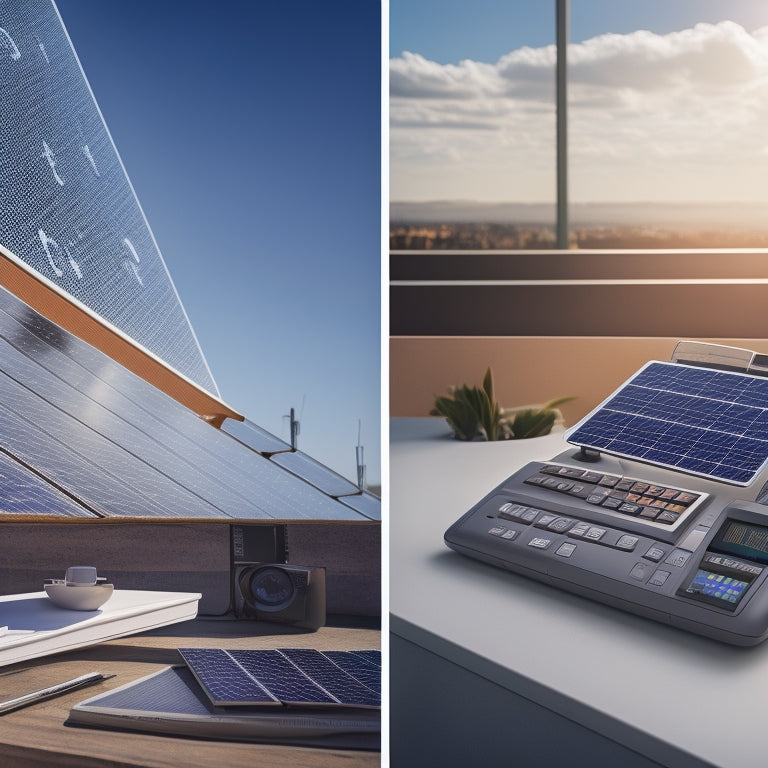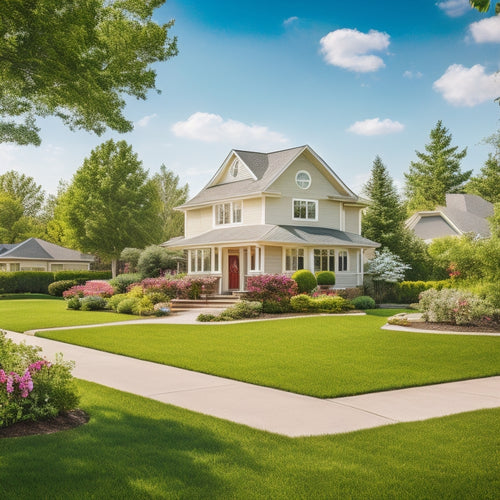
Solar Panel Cost: How Much per Watt?
Share
You're looking to invest in solar panels and want to know the cost per watt. For top-tier brands like SunPower, Panasonic, and LG, you can expect to pay between $2.50 and $3.50 per watt. A standard 5-kilowatt residential solar system typically costs between $15,000 and $25,000. Installation costs and incentives add an additional $2.50 to $5.00 per watt. The final cost depends on factors like system capacity, design, and installation company pricing. As you explore your options, you'll want to take into account these details to get the best value for your investment.
Key Takeaways
• The cost per watt of Tier 1 solar panels ranges from $2.50 to $3.50 per watt for top-tier brands like SunPower, Panasonic, and LG.
• Installation costs and incentives add $2.50 to $5.00 per watt, including labor, equipment, permits, tax credits, and state rebates.
• The overall cost of a solar panel system depends on factors such as system capacity, design, and installation company pricing strategies.
• High-efficiency panels command a premium price for superior performance and durability, resulting in a higher cost per watt.
• The average cost of a residential solar panel system is around $15,000 to $25,000 for a 5-kilowatt system, translating to a cost per watt of around $3 to $5.
Average Cost of Residential Solar
On average, you can expect to pay between $2.50 and $3.50 per watt for a residential solar panel system, with the total cost ranging from $15,000 to $25,000 or more for a typical 5-kilowatt system. This cost includes the installation of solar panels, inverters, and other necessary equipment.
As the cost of solar panels decreases, you're getting closer to achieving grid parity, where the cost of solar energy is equal to or less than traditional fossil fuels. This shift towards renewable energy is driven by advancements in technology and economies of scale.
Energy storage solutions, such as batteries, can further enhance the value of your solar investment by storing excess energy generated during the day for use during the night or on cloudy days.
With the average cost of solar panels decreasing, you can now harness the power of the sun to reduce your energy bills and carbon footprint. By investing in a residential solar panel system, you're not only saving money but also contributing to a sustainable future.
Factors Affecting Solar Panel Prices
As you consider investing in a solar panel system, you'll want to understand the factors that drive the cost per watt, including the type and efficiency of solar panels, the capacity of the system, and the installation company's pricing strategy.
Several key factors influence the cost of solar panels, including:
-
Supply chain efficiency: The cost of raw materials, manufacturing, and logistics can impact the final price of solar panels.
-
Material innovations: Advances in technology, such as more efficient photovoltaic cells, can increase energy output while reducing costs.
-
Installation company's pricing strategy: Companies may adjust pricing based on market conditions, competition, and profit margins.
- System capacity and design: The size and complexity of the system, including the number of panels and inverters, affects the overall cost.
Understanding these factors can help you make informed decisions when selecting a solar panel system that meets your energy needs and budget. By considering these variables, you can optimize your investment and maximize your return on investment.
Cost per Watt of Tier 1 Panels
When you're shopping for high-efficiency solar panels, Tier 1 panels typically range from $2.50 to $3.50 per watt, depending on the specific model and manufacturer. These premium panels boast high Efficiency Ratings, often above 20%, ensuring maximum energy production. You can expect top-tier brands like SunPower, Panasonic, and LG to fall within this price range.
When investing in Tier 1 panels, you're not only getting superior efficiency but also extensive Warranty Coverage. These manufacturers usually offer 25-year warranties, providing assurance that your investment will last for years to come. With Tier 1 panels, you can expect exceptional performance, durability, and reliability.
Keep in mind that the cost per watt may vary depending on the specific model, size, and features of the panel. However, with Tier 1 panels, you're paying for exceptional quality, high Efficiency Ratings, and thorough Warranty Coverage.
If you're looking for a premium solar panel solution that will provide maximum energy output and longevity, Tier 1 panels are an excellent choice.
Installation Costs and Incentives
You'll need to factor in installation costs, which can range from $2.50 to $5.00 per watt, depending on the complexity of the installation, local labor costs, and other site-specific factors. This amount includes the cost of labor, equipment, and materials, as well as any necessary permits and inspections.
To give you a better idea, here are some additional costs you'll need to take into account:
-
Permit fees: These can range from $500 to $2,000, depending on your location and the complexity of the installation.
-
Tax credits: You may be eligible for a federal tax credit of up to 26% of the total installation cost.
-
State rebates: Some states offer additional rebates or incentives for installing solar panels.
- Inspections and maintenance: You'll need to budget for regular inspections and maintenance to make sure your system is running efficiently.
Keep in mind that these costs can vary widely depending on your location, the size of your system, and other factors. Be sure to research the specific incentives and requirements in your area to get an accurate estimate of your total installation cost.
Cost of Solar Panel Systems
Calculating the cost of solar panel systems involves breaking down the total expense into its component parts, including the cost of the panels themselves, inverters, mounting hardware, and other equipment. As you consider investing in a solar panel system, it's essential to understand the costs associated with each component to make an informed decision.
When comparing different systems, you'll want to evaluate their energy efficiency and overall performance. A system with high-efficiency panels may cost more upfront, but it can provide more power per hour of sunlight, ultimately saving you money in the long run. Additionally, consider the inverter's efficiency, as a high-efficiency inverter can optimize your system's energy production.
When conducting a system comparison, consider the total cost per watt of the system, including the cost of installation, maintenance, and any warranties or guarantees. By evaluating these factors, you can determine the most cost-effective solution for your energy needs.
Price Difference by Panel Quality
As you weigh the costs of different solar panel systems, the quality of the panels themselves emerges as a significant factor, with high-efficiency panels commanding a premium price due to their superior performance and durability. You'll notice that high-quality panels are made with premium materials, which justify their higher cost.
Here are some key factors contributing to the price difference:
- Manufacturing process: High-efficiency panels undergo a more complex and precise manufacturing process, increasing their cost.
- Cell efficiency: Higher-efficiency panels convert more sunlight into electricity, resulting in greater energy output and a higher price tag.
- Durability: Premium panels are built to last, with enhanced durability and resistance to environmental factors, which adds to their cost.
- Warranty and certification: High-quality panels often come with longer warranties and certifications, such as UL certification, which increases their price.
When considering solar panel costs, it's essential to weigh the benefits of high-quality panels against their higher upfront cost. While premium panels may be more expensive, they can provide greater energy output and longer system lifespan, ultimately reducing your overall cost per watt.
Understanding Solar Panel Pricing
To accurately assess the cost-effectiveness of a solar panel system, it's essential that you understand the pricing structure, which is typically quoted in dollars per watt ($/W). This pricing model allows you to compare the costs of different systems and evaluate their efficiency.
When evaluating solar panel pricing, you should consider market trends and industry standards. Currently, the average cost of solar panels ranges from $2.50 to $3.50 per watt, depending on the quality and efficiency of the panels.
Industry standards dictate that high-efficiency panels typically cost more, while lower-efficiency panels are more affordable. You should also consider the overall system cost, including installation, inverters, and mounting hardware.
As you assess different options, keep in mind that cheaper isn't always better. Higher-priced systems often come with better warranties, higher efficiency rates, and longer lifespans.
Frequently Asked Questions
Can I Install Solar Panels on a Rented Property?
You'll need to exercise your renter's rights by obtaining landlord approval before installing solar panels on a rented property, ensuring a mutually beneficial agreement that outlines responsibilities and benefits for both parties.
Are Solar Panels Suitable for Homes With Shady Roofs?
Did you know that 80% of US roofs are suitable for solar? If you're wondering if solar panels are suitable for homes with shady roofs, the answer is yes, but you'll need to take into account Shady Areas and Roof Obstacles that may reduce energy output.
Do Solar Panels Work During Power Outages?
You'll be pleased to know that solar panels can work during power outages if you have a grid backup system with energy storage, allowing you to harness solar power even when the grid is down.
Can I Expand My Solar Panel System Later?
"Future-proofing" your solar setup is a bright idea! You can expand your system later, adding more panels or upgrading components as needed, thanks to modular designs that accommodate system upgrades and panel additions with ease.
Are Solar Panels Affected by Extreme Temperatures?
You'll be relieved to know that solar panels are designed with heat resistance, and their efficiency is affected by temperature, measured by the temperature coefficient, which is usually around -0.5%/°C, impacting your energy output.
Related Posts
-

What Are the Best Green Vehicle Product Platforms?
You're in the market for eco-friendly vehicles and wondering which platforms cater to your sustainable lifestyle. Top...
-

5 Tips for Efficient Last Mile EV Delivery
You're looking to supercharge your last mile EV delivery operations. Start by optimizing your fleet operations to red...
-

7 Best Financial Incentives for Residential Homeowners
You're entitled to a range of financial incentives that can help offset the costs of owning a home, from federal tax ...


